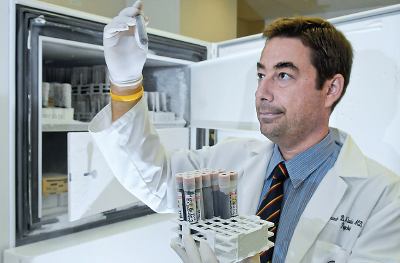Two-Part Assessment May Help Predict Suicidal Behavior, Study Finds
Abstract
A diagnostic that combines a clinical assessment with a blood test predicts future suicidal ideation in patients with a psychiatric disorder with an accuracy of over 90 percent.
People with mental disorders are at a higher risk of suicidal thoughts and actions, but trying to identify these at-risk individuals is problematic. Some patients may be reluctant to discuss suicidal feelings when asked by clinicians; others may have suicidal impulses arise quickly.
A team led by researchers at Indiana University (IU) School of Medicine is closing in on an accurate and objective tool that may be able to remove the need for guesswork about those at greatest risk of suicidal thoughts or actions. Their diagnostic test, which combines a blood analysis and clinical questionnaires, was found to predict suicidal ideation with about 92 percent accuracy in people diagnosed with depression, bipolar depression, schizophrenia, or schizoaffective disorder.
When focusing solely on patients with bipolar disorder, this test—known as universal predictor for suicide, or UP-Suicide—was even more reliable, achieving 98 percent accuracy for suicidal ideation.
UP-Suicide was also able to predict which patients would eventually translate thoughts into actions, though at a lower rate. The test was 71 percent accurate in predicting a future hospitalization due to a suicide attempt, and again it was more accurate when looking at patients with bipolar depression only (94 percent).
This work was published August 18 in Molecular Psychiatry.

Alexander Niculescu III, M.D., Ph.D., is hopeful that psychiatry can join other fields of medicine that make use of blood tests to obtain clinical information related to the risk of disease.
While predicting future suicide through a blood test and some basic questions may seem optimistic, or perhaps simplistic, lead study author Alexander Niculescu III, M.D., Ph.D., a professor of psychiatry at IU School of Medicine, believes it is feasible when considering suicide prosaically.
“Suicide is often complicated by thinking about the philosophical aspects of this act, but in a medical sense it is a cause of mortality just like heart disease and one that is influenced by biological and behavioral risk factors,” he told Psychiatric News.
“It’s not unreasonable that psychiatry should be on par with other medical specialties that make use of blood tests for clinical information that can help guide medical treatments and lifestyle changes,” he continued.
The Biology of Suicidal Behavior
The biological side of Niculescu’s test involved a set of 11 genes that showed substantial differences in their expression among psychiatric patients with and without suicidal thoughts or behaviors. The researchers identified these biomarkers from multiple groups of both living patients and those who had died by suicide.
The patient assessments consisted of a pair of simple tests that assessed important clinical and behavioral information. The first consisted of 22 binary questions that ascertained the presence or absence of certain mental, physical, and cultural risk factors for suicide to compose a composite risk score, while the second was a visually based test that measures a patient’s mood and anxiety levels.
“Importantly,” Niculescu said, “We made sure that neither test asks patients if they are thinking about suicide.”
He added that these two assessments—termed Convergent Functional Information for Suicide (CFI-S) and Simplified Affected State Scale (SASS)—are available as downloadable apps so physicians could use and test them right away.
According to Niculescu, more data on the biomarker panel are needed before he and colleagues can submit the test to the Food and Drug Administration for approval consideration. In particular, this current study used only male participants (to create a more homogenous sample for identifying gene differences), but Niculescu and his colleagues have a study in female patients in progress. Niculescu is also setting up collaborations with emergency units across the country in hopes of testing UP-Suicide in more people.
“It may still be a while before we can use these biomarkers as a clinical tool, but unfortunately such advances do move slowly, which speaks to how accurate a predictive test needs to be when dealing with suicide risk,” said Zachary Kaminsky, Ph.D., an associate professor of psychiatry at Johns Hopkins University who is also exploring biomarkers for suicide risk (Psychiatric News, August 14, 2014).
Still, the results of this broad and rigorous genetic analysis are an important step forward, Kaminsky noted, and not solely for the clinical potential. While the researchers used only the top 11 genes in their biomarker panel (which includes the stress-related gene SKA2 that Kaminsky and his team identified), their analysis revealed 76 gene changes that correlated with suicidal behavior. These genes offer new clues about the biology of suicidal behavior.
“Anytime you can show that there is biology that is being altered, it helps to demystify and destigmatize a condition,” Kaminsky said.
One of the tantalizing connections Niculescu highlighted was that several of the genes identified were linked to a protein known as mTOR, which mediates the rapid antidepressant effects of ketamine; this provides some rationale that ketamine might offer a similar rapid response to help people who are acutely suicidal.
This research was supported by a National Institutes of Health Directors’ New Innovator Award and a Veterans Administration Merit Award. ■
“Understanding and Predicting Suicidality Using a Combined Genomic and Clinical Risk Assessment Approach” can be accessed here.



